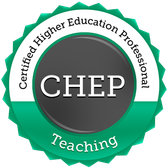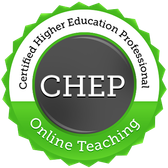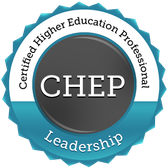Badge Evidence | Completed Courses (4 Hours Each)
CM102Raising the Bar - Compliant Communications with Students
This course is designed for employees of all roles and levels at institutions that participate in federal financial aid programs. The course provides an awareness of prohibited acts which could adversely impact operations, and covers the requirements which must be adhered to in order to maintain good standing with state* and federal regulations as outlined in the Program Integrity rules. Emphasis is on areas of misrepresentation related to advertising and recruitment activities, interactions with prospective students and appropriate communication of disclosures and other publications.
*This course currently covers the regulations for the following states: AZ, CA, CO, FL, GA, IL, IN, KS, LA, MA, MI, MN, MO, MS, NC, NM, OH, OK, OR, PA, SC, TN, TX, VA, WA. Course participants can select specific state(s) at the beginning of the course to customize the training content to their state.
CM141FERPA and Privacy: A Practical Approach
The Family Educational Rights and Privacy Act of 1974 (FERPA or the Buckley Amendment) is a federal law in the United States designed to provide students with access to, and the privacy of, their educational records. The law applies to students in higher education and educational institutions that receive funding under a program administered by the U.S. Department of Education. This course is designed to provide participants with a working knowledge of FERPA guidelines to ensure proper handling of educational records and other institutional requirements.
CM151Onsite Visits - Be Ready Anytime
Is your campus ready for a full unannounced visit at any time? Onsite visits are becoming more frequent in recent years and unannounced visits even more so. This training is designed to aid campus leaders to be prepared, using best practices and practical tools, to host an onsite visitor at any time, including visits that are unannounced, by any organization such as state agencies, veterans' organizations, regional, national and programmatic accrediting agencies and the Department of Education.
EC131How to Develop Virtual Reality Lessons
Virtual reality (VR) lessons can be implemented in all subject areas, and this course is designed to get teachers thinking about how it can be used in their classrooms. VR can be a nice addition to the teaching toolkit, but some resources, including hardware, will be needed. In this course we use the Meta Quest 2 headset by Oculus, but the results will be similar if different headsets are used. Various software applications will be shared that teachers can acquire for little or no cost.
ED101Effective Teaching Strategies
This introductory course covers the essential roles of a teacher and the competencies required to be a successful instructor in an educational institution. Proven techniques and strategies for planning and preparation are presented and discussed. In addition, the course offers effective methods for conducting the first class meeting and delivering course content. This course provides a solid foundation for new instructors and serves as an excellent refresher for more experienced instructors.
ED103Student Learning and Assessment
Educators work with students who want to learn specific skills that will lead to fulfilling careers. As educational instructors it is our job to help each student to achieve this goal. Just as you may have a particular style of teaching that you prefer, your students have preferred ways of learning. This course will help you to identify the different learning styles of your students so that you can adjust your instruction to better accommodate them. Good teachers also regularly monitor the effectiveness of their instruction by assessing their students’ learning. This course will examine several aspects of assessment including how to create good tests, how to ask effective questions and how to get your students to actively participate in their learning by asking questions themselves.
ED104Class Management Strategies
This course provides methods and techniques for managing students and class activities. We start by reviewing the steps instructors need to follow as they introduce a class to new students. We then discuss strategies to effectively deal with unfocused and challenging students. The course ends by describing common mistakes made by instructors and ways to avoid them.
ED109Preparing and Creating Lesson Plans
This course will inform you of how careful lesson planning can help to ensure increased student engagement. Proper lesson planning will enable you to teach effectively and efficiently, and ultimately help students meet learning objectives. The information in this course will provide the framework for instructional development enabling you to properly structure a detailed, well thought-out lesson plan.
ED112Influencing Student Motivation
This course is intended to offer a practical explanation of how an instructor’s behaviors and choices can influence the motivation of students. It is not intended to be a theoretical or academic treatise about motivation. Module 1 offers useful tips that may help instructors to motivate students. Students’ security and autonomy are described as they influence motivation during instruction, questioning, activities, and evaluations. This is followed by a discussion of how motivation can be improved by enhancing students' sense of autonomy when making assignments, selecting instructional methods, implementing classroom procedures, and developing evaluations. In Module 2, intrinsic and extrinsic motivators are defined and compared. Finally, a variety of "miscellaneous motivators" are offered for instructors to consider.
ED113Managing the Adult Classroom
This course compares and contrasts four styles of classroom management. The course includes "virtual visits" to animated classrooms where participants observe four instructors who exhibit different management styles. The style that is preferred by most students is identified and described, and suggestions are offered on how instructors can modify their personal style to increase their effectiveness. A four-step model for developing successful classroom management strategies is presented and is followed by a discussion of a practical, behavioral approach to classroom management. Characteristics that foster good discipline in the educational institution and in the classroom are listed and explained, and tips are offered that can improve both institution-wide and classroom discipline. Finally, a number of scenarios involving common discipline problems are described.
ED114Questioning in the Classroom
Questioning can be one of the most effective classroom teaching strategies. However, many instructors are not familiar with the techniques and research findings associated with good questioning. This course begins by comparing and contrasting the major types of questions and their most appropriate uses. Some relevant statistics and research findings are presented, followed by a discussion of four effective questioning practices. The course concludes by offering a few tips and suggestions for instructors to consider.
ED115RSoft Skills for Instructors
This survey course provides an introductory discussion about how good soft skills help instructors to be successful. A distinction is made between hard skills, soft skills, people skills, and workplace behaviors. Selected soft skills are listed for various categories of businesses and industries, including the teaching profession. Two studies are referenced that highlight skills that are frequently cited in the literature. One study was published in 1997, while the other was conducted specifically for this course in 2024. Selected tips are offered for improving one's soft skills. Numerous hyperlinks are included that direct the reader to a variety of online enrichment materials, including a few online instruments that help individuals learn more about their own soft skills.
ED120Nonverbal Communication in the Classroom
Studies reveal that as much as 85% of classroom communication is nonverbal. This course consists of eight entertaining modules that include audio tracks, animation and interactivity. Topics include the importance of nonverbal communication in the classroom, as well as our everyday lives. The modules describe the use of body language, effective vocal cues, proper appearance and the effective use of space (proxemics) and time (chronemics). A variety of support materials accompany the modules, including an assessment tool that instructors can use to evaluate their nonverbal skills.
ED125Effective and Efficient Instructional Strategies
Planning Effective and Efficient Instruction provides new and experienced instructors with practical ways to design and deliver learning experiences that establish an environment that facilitates learning. The course summarizes important academic concepts while providing specific strategies for planning lessons, reaching learners, asking questions and assessing student mastery of the course and program objectives.
EL102Online Teaching Techniques
Your degree of success as an online instructor relies heavily on several factors, among which are your level of preparedness before the date on which the course is launched; your ability to make a smooth transition into the roles and responsibilities associated with teaching in an online environment; and the effectiveness and efficiency with which you manage learners, instructional transactions embedded in the course as well as the learning environment. In this course, you will learn how to project your authority and presence into the e-learning environment, build a relationship with each learner, promote and nurture learner participation, provide informative and constructive feedback in a timely manner, minimize attrition, manage communications, manage unacceptable behavior and resolve disagreements.
EL103RTeaching Online: A Student-Centered Approach
This course will provide you with the knowledge and skills to successfully author, teach, assess, and revise online courses. You will learn to develop a course framework with consistent modules. Building an online community and constructing a dynamic syllabus are important in helping you communicate with students. You will also learn how to develop an assessment plan that includes peer and self-assessment. No online course is complete without a comprehensive revision cycle. This course will walk you through the process of "closing the loop" to create a complete revision and improvement plan for your online course. We will provide you with ideas for student-centered learning that includes activities and intellectual interactions using a variety of technological tools.
EL104Teaching and Organizing a Virtual Learning Environment
This course will provide you with basic information to teach in a virtual learning environment and understand the importance of organizing course content. You will learn about the important role technology tools play in teaching and organizing an online course. You will also learn the difference between synchronous and asynchronous learning. As the components of each are discussed, you will further identify appropriate methods, develop guidelines, organize content, and establish a pattern of teaching for each method.
EL108Preparing Students to Become Good Online Learners
This course will provide you with strategies and techniques to help prepare students for the online environment. To do so, you must also assess your strengths and weaknesses as an online instructor. As you help students assess their readiness for online learning, you are also preparing them for the expectations and realities of the online environment. By identifying students' strengths and weaknesses, you can provide guidance to help them achieve the learning outcomes. This course not only notes the necessary technical skills, it also discusses non-technical skills as well as techniques for successful learning and helping students develop their online persona.
EL113Active Learning in an Online Environment
This course will provide you with a basic overview of the background and history of the popular instructional method called active learning. This method differs from traditional educational methods such as the lecture model. Active learning has a definite place in education especially in the online learning environments. It is used to support teaching outcomes like critical thinking skills, interpersonal skills and knowledge acquisition that all instructors wish for their students. However, active learning it calls for a change of attitude on the part of students and the instructor in order to be successful. But the advantages far outweigh the disadvantages as it can make students enthusiastic about learning. Learn about this brave new world of teaching and learning for the next generation.
EL114Respecting Copyrights and Leveraging Available Resources
This course provides a basic overview of the background and history of the usage of copyrighted materials in U.S. education. Copyright usage is an often-misunderstood area of education. This course will help build an awareness of the U.S. Copyright Law and its various components. Instructors will be given practical examples on how to correctly use copyrighted materials in their classrooms. In the 21st century, many students do not recognize common concepts such as pirating of music and videos. Instructors are on the frontline in education and can educate newer generations on the ideas of fair use, intellectual property, and piracy issues.
EL115RGaming and Simulation in Online Learning
This course will provide you with strategies and techniques to immerse students in an interactive environment that will incorporate gaming and simulations to introduce, engage, and reinforce online learning. This course will begin with definitions of gaming and simulations as a tool for online learning and will provide guidance to evaluate, implement, and assess the effectiveness of games.
EL120Fully Online Doesn't Mean Inactive
Active and passive learning are critical concepts to ponder for online learning. Each one has positive benefits when explored and applied in the context of learning and the designing of instruction. There is, however, a difference between passive and inactive. One is an intentional part of learning while the other is the absence of something. We will explore these and other concepts in this course. In addition, strategies will be shared that will enable educators to make their online instruction more engaging and beneficial for learners.
EL121Teaching Skills and Trades Online
Although online learning is becoming more normalized in our educational institutions, there are still many questions about its effectiveness for certain areas of study and training. There remains an idea that online learning is mostly passive and therefore unsuitable for anything active and specifically the development of skills and trades. This course will explore the changing realities of online learning and how effective it can be in the training of skills and trades. Strategies will be shared to facilitate the online teaching of applied skills in simulated and real-world settings.
EL141Engaging Online Learners
This course will explore the online learning landscape and how to ensure learner engagement remains high, even when working virtually. The course discusses various aspects of online education, as well as discussing techniques for both social and motivational forms of engagement and how to apply them appropriately in courses.
The goal of this course is to help develop a better understanding of the topic and produce tangible resources to help implement plans, strategies, and ideas at your school. In addition to lecture videos, links to possible resources, and assessments, you will be able to utilize the Journal and Learning Activities. Take advantage of a method that best works for you.
LS101RDo You Manage Or Lead?
This course explores the critical differences between management and leadership. Participants will be introduced to definitions and myths about each area as well as how management and leadership must coexist for an organization to operate effectively. Participants will explore their own management/leadership tendencies through exercises to see leadership and management in action.
LS102How Do You Lead?
Not everyone is suited for, or desires, a leadership position. One of the first steps to being an effective leader is to understand the desire to lead in the first place. Participants will explore their motivation to lead and develop a deeper understanding of their leader style(s).
LS103RYour Leadership Impact
To improve your impact and effectiveness as a leader, you must not only understand the role of a leader, but you must also take into consideration the followers and the situation. This course defines leadership impact and explores the interactional framework for leadership.
LS104RYour Leadership Legacy
The higher education industry provides a wealth of opportunities and challenges for those seeking leadership positions. In this course, participants will gain a deeper understanding of the higher education sector and themselves. The importance of higher education institutions will be explored along with developing a personal leadership legacy.
LS105RYour Leadership Toolkit
Get ready to add a number of skills to your toolkit as you develop as a leader! This course focuses on increased self-awareness in communication styles and learning; developing deeper understanding through empathic listening; and motivating through innovation.
LS106This Way to Leadership
This course provides you with a framework to put your self-discovery and learning into a workable plan to further develop your leadership skills. A step-by-step process is offered to help you create a meaningful Personal Leadership Development Plan (PLDP) complete with the development of SMART Goals and advice from some of today's leaders in the higher education sector.
ML111Leading and Motivating
This course provides a synopsis of the essential tasks of leadership setting direction, aligning people, and motivating others. You will learn how to recognize the skills and characteristics of effective leaders, create an inspiring vision, and energize people to support and work toward your goals.
ML113Team Management
Focus is essential to effective teamwork. In this course, you learn how to diagnose and overcome common problems - such as poor communication and interpersonal conflict - that can impede team progress. You will also learn to take corrective measures to remove team problems and improve team performance.
ML117Presentation Skills
This course provides sound advice on preparing and delivering presentations that command attention, persuade, and inspire. It includes rehearsal techniques as well as tips for creating and using more effective visuals. The course also addresses the importance of understanding your objectives and your audience to create a presentation with impact.


















































